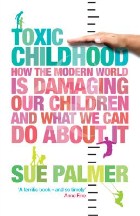
It would be easy to dismiss this book as largely fearmongering, given the attention-seeking title. However, it’s much better than that.
What’s it about?
A few years ago, Sue Palmer, literacy expert, stepped aside from her day-to-day professional activities and began to examine a range of cultural factors that were having a growing impact on children. In doing so, she aimed to discover why one in five children suffer from mental health problems or behaviour or learning difficulties.
‘Absolutely essential reading for anyone who has, or who works with, children. It’s like Eric Schlosser (author of the exposé Fast Food Nation) for parenting’ – Lovereading.co.uk
In this book, Palmer aims to explain these factors clearly, providing parents and other interested parties with research-based evidence to bolster their confidence and resolution in guiding children throughout their development. Furthermore, she provides strategies, ranging from domestic to local to national and political to ultimately detoxify childhood for all children.
Topics include the vital importance of healthy home-cooked food, imaginative and outdoor play, getting plenty of sleep and enjoying attentive adult communication. Palmer also examines what forms of childcare and education suit children best at different ages, how we can use the global electronic village without being consumed by it, and how we can protect children from the negative effects of advertising and celebrity culture.
What’s it like?
As a teacher, some of the ill-effects of insufficient sleep and inadequate nutrition have long been clear to me. It is very difficult to encourage your average teenager to take school-work seriously when they have been up til midnight playing GTA 4 and arrived at school without eating breakfast, or, possibly worse, pumped full of sugar from sweet treats. Most parents know this, even if they feel powerless to stop it.
Empowering parents is exactly what Palmer does throughout, by admitting the scale of the problem, carefully examining the causes, and then outlining the necessary solutions. These range helpfully from the minor (remove TVs from children’s bedrooms, talk to them about how advertising works) to the major (join the PTA and campaign for the removal of junk food vending machines in school, write to your MP to request a law banning advertising to under-12s). Even for the most time-pressed parents, some of the changes will be feasible.
Empowering parents is exactly what Palmer does throughout, by admitting the scale of the problem, carefully examining the causes, and then outlining the necessary solutions.
Palmer believes that once parents are empowered with knowledge, they will act with greater confidence and be more likely to make healthy changes for the benefit of their families. To support this desire for change, each chapter concludes with bullet pointed guidance on: detoxing the area under discussion (e.g. education, childcare), what parent power can do, suggestions for further reading, and useful websites. This makes it easy to follow up specific interests.
Of course, sometimes the children who most need these changes are those whose parents are least likely to have the time or inclination to read this book. Palmer is well aware of this so each chapter closes with a brief section called ‘Mind the Gap’, in which she explains why all of these problems are so much worse for children from impoverished backgrounds. In doing so, she is not simply setting out to send shivers down the spine of anyone with a conscience, though she certainly achieves that, but to remind us that it is in everyone’s interests to help those at the bottom and avoid civic unrest.
In a nutshell, Palmer advocates authoritative but not authoritarian parenting, supported by greater government regulation, such as banning junk food near schools.
In a nutshell, Palmer advocates authoritative but not authoritarian parenting, supported by greater government regulation, such as banning junk food near schools. She doesn’t pull any punches, suggesting at one point that, if you are not willing to shoulder the intense responsibility of becoming a parent, you should seriously consider remaining childless.
Palmer isn’t simply advocating holding onto the past; she recognises the benefits of living in a global electronic village; but she feels strongly that we need to establish roots in our real-life communities and recreate a time when adults trusted each other with our children. Ideas like this do seem too idyllic to ever be realised, but perhaps that is a sign of how far we have strayed from our roots.
Final thoughts
Inevitably, Palmer will largely be preaching to the converted here. Anyone who is perfectly happy with the state of children and childhood today is unlikely to pick up this book, which is a shame, because it provides such excellent guidance for the way forward. Ultimately, as Palmer argues, it’s up to those most invested in children’s welfare – parents – to stand up and demand change. She seems to believe it’s possible. I’m less sure, but this book has certainly inspired me to try.
Next on my to-do list? Look at how Sweden developed a ban on marketing to under-12s. It’s good to be ambitious…